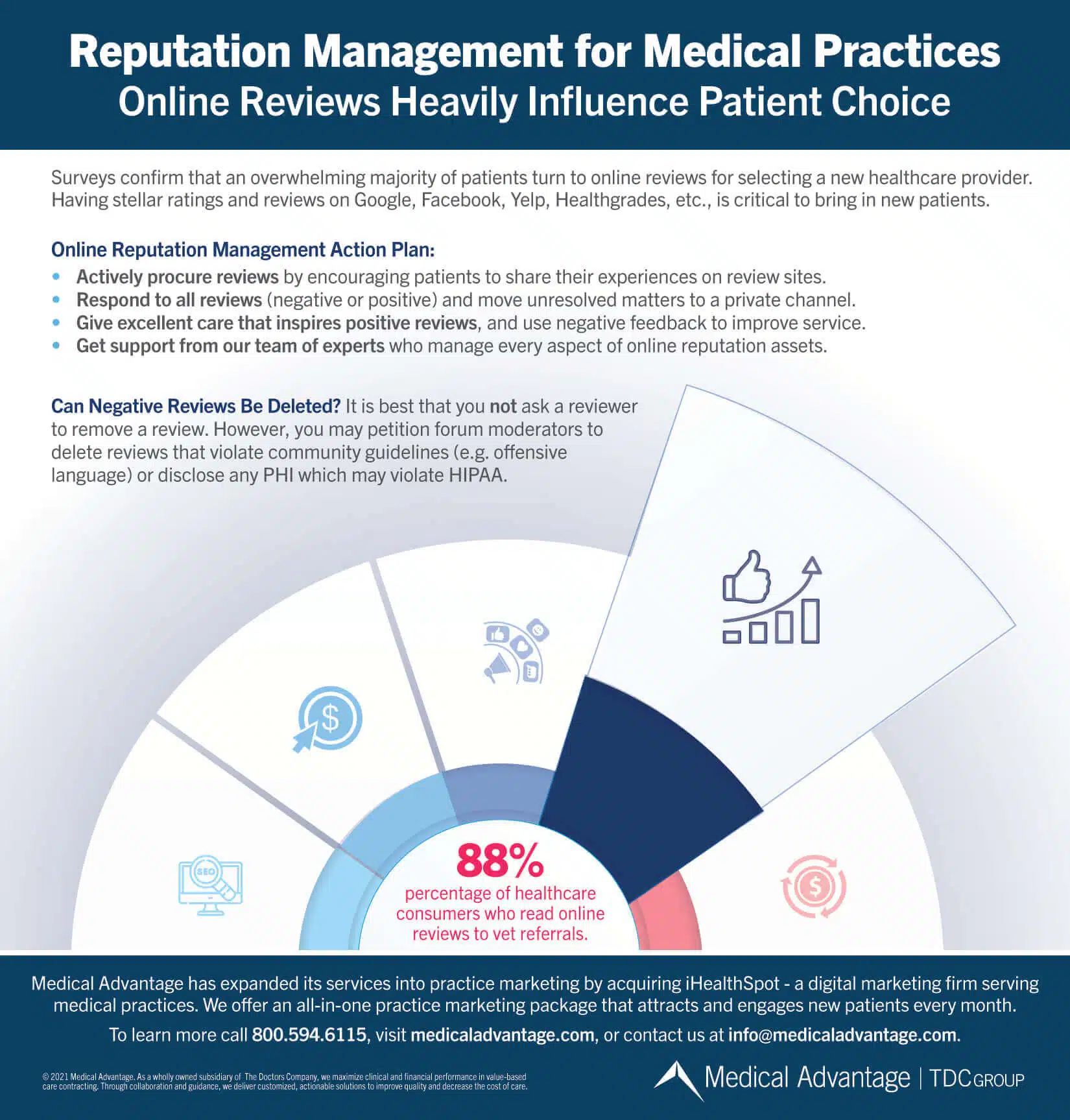
Online reputation can be the proverbial elephant in the room – a problem that is wished away. This passiveness perhaps stems from the myth that little can be done to rectify a poor or mediocre online reputation. Enter online reputation management – the notion that an establishment plays a role in the ratings and reviews process raises questions about how it works. How much does online reputation management really change how a healthcare brand is presented online? Find answers to your reputation management questions here.
What Is Online Reputation Management?
One of the first questions around reputation management is, “What it is?” How can anyone influence a conversation controlled by the consumer?
Online reputation management is a set of action steps designed for improving star ratings, monitoring reviews, and engaging in public relations to improve the image of a business or brand. Online reputation management for healthcare professionals includes proactive measures to remain accountable to care quality.
Why Does My Online Reputation Matter?
A doctor.com patient survey found that nearly 90% of healthcare consumers turn to online reviews to choose a provider. This report also concludes that the majority of patients will only consider a practice with a star rating of four or above. Other incentives for actively engaging with your online reputation are:
- Patient retention: Some patients change providers without saying anything about being dissatisfied, but a patient who leaves a negative review may be giving your practice one last opportunity to correct a situation before they go elsewhere.
- Public relations: A Glassdoor survey found that 70% of job seekers would reconsider an employer who responds to reviews. What this means is that while people are reading reviews, they can also read the replies. Showing you care about the level of quality you provide improves your public image.
- Getting a fair shake: Too many negative reviews can distort the true quality of your care. Practices so busy providing the best patient care that they haven’t looked at their online presence at all deserve an online reputation that better represents them.
- Employee morale: If all practice staff ever hears is criticism, this can lower their motivation to provide the best care. Proactively seeing those reviews can yield positive reviews that balance out the negative feedback.
- Harvesting improvement opportunities: Sometimes care delivery problems can fly under the radar. Patient feedback can unearth what’s not working and what is.
- Protecting patient privacy: Sometimes patients will say too much, and you can help protect their privacy by having those reviews removed (more on this later) and moving the conversation to a private channel.
How Do I Respond to a Negative Review?
For starters, the worst thing you can do about a negative review is nothing – it is vital to address published negative feedback promptly. However, negative reviews must be handled tactfully and cautiously.
Tips for Responding to Negative Online Reviews
Before responding to negative reviews, there are key aspects you should consider:
- Even if the review is unfair, be compassionate and kind in your responses. Craft your responses with professionalism and finesse and do not return fire with fire. Don’t respond until your anger has waned.
- Be careful not to discuss the patient’s medical issues in replies even if the patient brings it up in the review (doing so would violate privacy laws). It is also best to avoid a back-and-forth conversation altogether. Encourage the patient to take the discussion to a private and secure channel.
- If the review appears to be a troll or prank review, refrain from engaging. You may report the review for community guidelines violations when applicable.
- Follow up with the patient privately after the public exchange. This will show that you sincerely care about the situation and that you are diligent to resolve the matter.
Negative Review Response Template
Here are components to include in your response:
- Thank them for the review and for providing feedback.
- Acknowledge the complaint itself so the response does not sound canned. Keep the response about their experience, without a discussion about your practice operations.
- Offer an apology and share what proactive measures you will take to prevent it from happening again.
- Ask them to contact you directly so you can resolve the matter to their satisfaction, leaving your name and phone number or email address.
Can a Negative Review Be Removed?
Getting an unfair review can be frustrating, so if a review can be removed is one of the most asked reputation management questions. In some cases, a negative review can be removed, but it is poor form to ask the patient to remove the review. Our medical reputation management experts discourage asking for a review to be taken down by the person who wrote it.
What not to do about a negative review: ask the patient to remove it.
This is where it helps to understand the guidelines and policies of the platform where the reviews are left such as Facebook, Google, Yelp!, Healthgrades, and more. Inappropriate language or revealing personally identifying information may warrant review deletion depending on forum rules.
How Do I Improve My Online Reputation?
Aside from being proactive to respond to both negative and positive reviews with a friendly and professional tone, procuring more reviews is the best way to improve your online reputation.
To improve your star rating average and to suppress negative reviews, you need more reviews for better balance. Gaining more reviews from your patients is as simple as asking. Leverage your EHR (electronic health record) to send out review requests, and post signs in the office that encourage patients to leave reviews online.
Meanwhile, a practice should be improving its service and methods to mitigate further negative reviews. The best way to have a great star rating is to deliver a stellar patient experience consistently.
How Can We Encourage Patients to Leave Reviews?
To procure more patient reviews, be persistent without being a pest. Send requests to patients after visits and somewhere in-between visits via text message, or email.
Drop hints in common areas, such as the waiting room. For example, an orthodontist in Cedar Park, Texas put up a sign asking patients to review the practice on Yelp, and underneath pinned thank you cards and letters from patients.
How Can I Maximize My Medical Practice’s Reputation on Social Media?
Social media is, perhaps, the best way to capture positive patient sentiment with online visibility. Onlookers can see how many followers you have, how much engagement your account gets, and with Facebook, users can see if any of their “friends” have either liked your page or checked into your practice which serves as an endorsement.
Social media posts that feature familiar faces can elicit responses from followers such as, “That’s my doctor who did a wonderful job with my surgery.” In this case, comment sections serve as a mini-review section.
Keep an eye on your social media engagement. If a patient leaves a flattering comment on one of your social posts, you may consider approaching them to leave a review elsewhere.
Does Medical Reputation Management Affect SEO (Search Engine Optimization)?
Medical practice online reputation can also influence how Google ranks local search. When a patient search triggers local results such as “therapist near me” this brings up only three practices initially called the “local pack.” The user can expand the map to see a comprehensive list of nearby practices, but top results will get the most brand exposure in search.
Who appears in Google’s “prime real estate” for local search is determined by which ones send the best signals that the practice is reputable. One of the factors is Google’s very own “Google My Business” feature, where business profiles are able to collect and display reviews. Practices with better star ratings and reviews tend to make it to the top three.
iHealthSpot Offers Solutions to Get Your Practice Online Reputation Back on Track
Final reputation management question: What can be done to help the online reputation of a medical practice? Plenty. Get in on the conversation with the help of iHealthSpot.
- We ensure that all of your online listings (on Google, Facebook, Healthgrades, Yelp, etc.) are claimed and updated.
- We respond cordially to positive reviews and escalate negative ones to your practice within one business day.
- We can request that reviews be removed for contents that violate policies such as authenticity, profanity, HIPAA (Health Insurance Portability and Accountability) violations, etc.
- We offer regular reporting that keeps you apprised of your online reputation health.
- We can send out review requests to your patients manually, or help you configure your EHR to this automatically.
Many medical practices don’t have the time nor the resources to monitor reviews, engage with patients leaving reviews, and curate more reviews. Our team of online reputation experts can help. Reach out for no-obligation consultation from iHealthSpot!



